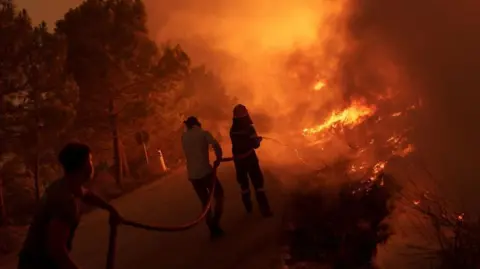
 Getty Images
Getty ImagesGlobal efforts to tackle climate change are wildly off track, says the UN, as new data shows that warming gases are accumulating faster than at any time in human existence.
Current national plans to limit carbon emissions would barely cut pollution by 2030, the UN analysis shows, leaving efforts to keep warming under 1.5C this century in tatters.
The update comes as a separate report shows that greenhouse gases have risen by over 11% in the last two decades, with atmospheric concentrations surging in 2023.
Researchers are also worried that forests are losing their ability to soak up carbon, which could be contributing to record levels of warming gas in the atmosphere.
 Getty Images
Getty ImagesUN Climate Change, the UN agency tasked with adressing the issue, has carried out an analysis on the carbon cutting plans that have been submitted by close to 200 countries.
The UN wants to see how much progress is being made in driving down emissions that are threatening to push global temperatures well above 1.5C this century, a level beyond which scientists say extremely damaging impacts will occur.
Right now, when the plans are added up, they indicate that emissions will likely fall by just 2.6% by 2030 compared to 2019.
This is far short of the 43% reduction that scientists say will be needed by the end of this decade to keep the world on track for net-zero carbon by 2050.
“The report’s findings are stark but not surprising,” said Simon Stiell, executive secretary of UN Climate Change.
“Current national climate plans fall miles short of what’s needed to stop global heating from crippling every economy, and wrecking billions of lives and livelihoods across every country.”
The UN says that countries are expected to submit new, stronger plans by Spring next year – discussions about increasing the ambition of these efforts will be a major theme when world leaders gather at the next UN climate conference, COP29 in Azerbaijan next month.
 Getty Images
Getty ImagesForest feedback loop
Adding to the concerns about the way the world is handling climate change, the World Meteorological Organisation says that concentrations of greenhouse gases reached a record high in 2023.
The rise last year was higher than the previous 12 months, due to record fires in Canada, and the onset of the El Niño weather event all adding to ongoing emissions from fossil fuels.
But the WMO’s scientists also says they have seen some evidence that as the world gets warmer, trees are not able to soak up the same level of CO2 as they once were.
Data indicates that the southeastern Amazon has now turned from a carbon sink to a source.
“In the Amazon, deforestation means you lose the forest,” said Dr Oksana Tarasova from the WMO.
“Then the temperature started increasing, then the air circulation pattern changes. There is less precipitation, less uptake of CO2, that means more CO2 stays in the atmosphere.”
The Amazon is one example of what scientists call a climate feedback – where rising temperatures can act on natural systems to enhance the causes of warming.
So if the forests and the oceans become less able to soak up CO2, global warming could accelerate more rapidly.
“We do see some clear signals. We cannot say it’s 100% climate feedbacks because there’s substantial variability because of El Niño and La Niña weather events, but we are seeing something happening in the system,” said Oksana Tarasova.
The WMO says that the last time the Earth experienced a comparable concentration of carbon in the atmosphere was 3-5 million year ago – when average temperatures were 2-3C warmer than they are now, and sea levels were 10-20 metres higher.

